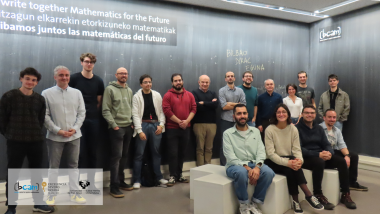Lander Rodriguezek bere tesia defendatuko du urriaren 9an
Defentsa UPV/EHUren Leioako campusean izango da, 10:30ean.
Lander Rodríguez matematika aplikatuetako ikertzailea da, osasun zientzietako ikuspegia du, baina interes handia du kirol arloan eta beste arlo batzuetan ere. Industria Ingeniaritzan graduatua da eta Industria Ingeniaritzako Masterra du, biak Bilboko Ingeniaritza Eskolan lortuak. Makina-erremintari eskainitako ikerketa-zentro batean hainbat urtez lan egin ondoren, bere benetako pasioa matematikan — batez ere estatistikan eta machine learningean — eta bere aplikazio praktikoetan zetzala konturatu zen. Horren ondorioz, doktoretza 2021aren amaieran hasi zuen BCAMen, Euskal Herriko Unibertsitatearekin (EHU) lankidetzan.
Irantzu Barrio irakasleak (EHU & BCAM) eta José María Quintana López doktoreak (Osasun Sistemak Ikertzeko Biosistemak Institutua) zuzendu dute tesia, “Análisis de la pandemia de la COVID-19 en el País Vasco y caracterización de los perfiles de infección” izenburupean. Defentsa 2025eko urriaren 9an egingo da, 10:30ean, EHUren Leioako campusean.
BCAMen izenean, etorkizunerako onena opa nahi dizugu, bai arlo profesionalean, bai pertsonalean.
Abstract
This thesis presents a comprehensive analysis of the COVID-19 pandemic in the Basque Country, using advanced statistical methods to capture its complexity and extract lessons for future health crises. Based on a database that included all SARS-CoV-2 adult infections that occurred in the Basque Country from March 1, 2020 until January 9, 2022, the research applied Bayesian spatio-temporal modeling to examine the geographical and temporal variation of infections, hospitalizations, deaths, and reinfections and the factors influencing them. Results revealed socioeconomically disadvantaged regions faced higher risks of severe outcomes, while rural areas may have faced barriers to hospital access.
In parallel, clinical phenotyping was performed through clustering techniques based on basic patient data, identifying meaningful patient profiles within the general COVID-19 population, among emergency department patients, and among reinfected individuals. These phenotypes, developed in an unsupervised manner, were associated with the clinical outcomes of the disease, suggesting the potential prognosis of patients can be anticipated through a simple classification system. This could be really valuable during new pandemics, as the most vulnerable groups could be rapidly identified, even before outcomes were available. In addition, the phenotypes proved stable across different pandemic phases, suggesting an initial segregation of the phenotypes is still valid at different stages of the pandemic. Reinfection analyses uncovered behavioral and demographic differences that influenced both the timing and severity of secondary infections.
Altogether, this thesis provided an in-depth analysis of the COVID-19 pandemic in the Basque Country. While the approaches presented were tested locally, they have the potential to be used in other regions and other pandemics, enhancing our preparation for potential future threats.
Related news
BCAM pertsonak




